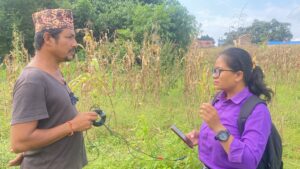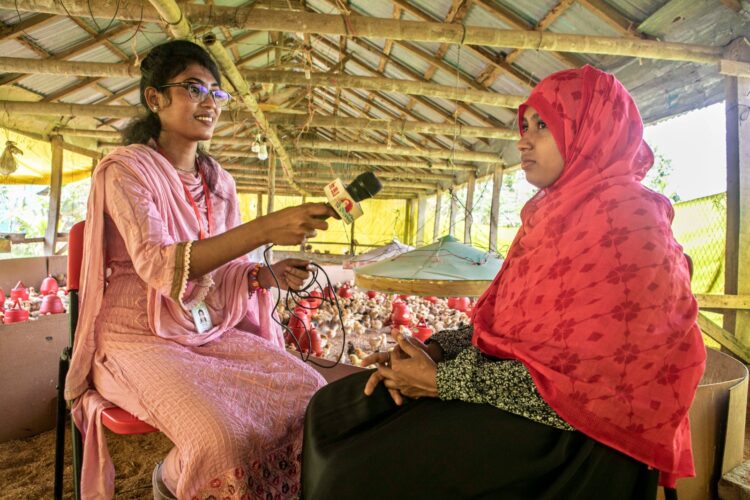ComDev Asia (CDA) spotlights family farming’s impact, while AMARC Asia-Pacific empowers through community radios, amplifying voices for a sustainable future.
ComDev Asia’s (CDAs) ongoing initiative aligns Family Farmer Organization (FFOs), Food and Agriculture Organization (FAO), and communication networks to spotlight family farming’s vital role in sustainable food systems. It aims to heighten awareness about the United Nations Decade of Family Farming’s (UNDFF’s) progress and family farming’s significance while amplifying the farmers’ voices. This initiative showcases UNDFF advancements through National Action Plans in Asia-Pacific countries, emphasizing farmer experiences and project achievements supporting sustainable food systems. ComDev Asia’s UNDFF radio initiatives in Asia have a threefold focus. Firstly, they aim to heighten awareness regarding family farming’s pivotal role in sustainable food systems, emphasizing policy advancements. Secondly, these efforts strive to disseminate pertinent farming issues and prioritize farmer concerns, fostering collaborations among radios, farmer organizations, and FAO projects. Lastly, they seek to elevate radio’s utility as an interactive tool, actively supporting the evolution and empowerment of family farming within the community.
Within this framework, AMARC Asia-Pacific, renowned for championing community radio, collaborates closely with FFOs. Their goal is to enhance FFOs’ access to community broadcasting, thereby maximizing its benefits. With an extensive Asia-Pacific network, AMARC Asia-Pacific supports ComDev Asia’s endeavors, emphasizing the essential role of family farming in global food security. Through this partnership, AMARC Asia-Pacific fosters international cooperation and elevates the narrative around family farming’s crucial contribution to sustainable food systems. AMARC Asia-Pacific’s collaboration with FAO within the UNDFF primarily centers on empowering the FFOs through improved communication capacities, in line with Pillar 4 of the UNDFF Global Action Plan. The Participatory Communication Plans (PCP), executed regionally each year, serve as crucial tools to advance UNDFF objectives.
Thakur Bhandari, Chairperson of the Federation of Community Forestry Users Nepal (FECOFUN), highlights the project’s captivating aspects and benefits. He states that the most intriguing part was the platform that facilitated local communities to voice their needs and policy challenges, fostering dialogues among policymakers, advocacy groups, and community forestry users. The broadcast via Radio Prakriti reached millions, updating community members on forestry, agroforestry, and family farming, enhancing awareness significantly. FECOFUN’s collaboration with AMARC Asia-Pacific, FAO, and the International Union for Conservation of Nature (IUCN) brought forth innovative ideas. It aligned them with the forestry and family farming sectors, establishing crucial connections with implementing authorities. He expresses eagerness for the project’s implementation phase.
Regarding the partnership with community radios, Mr. Bhandari strongly advocates for its continuation. Recognizing its impact in raising pertinent community issues and fostering dialogues, he emphasizes the program’s significance. Advocating for regularity and broader dissemination, he sees the program’s continuity as pivotal in sharing local perspectives and addressing crucial topics nationally, crucial for community prosperity.

Megha Rameshbhai Desai, Senior Project Coordinator at Self Employed Women’s Association (SEWA) in India, finds the project’s audio program, supported by AMARC Asia-Pacific, profoundly beneficial. SEWA tries to address the question “Why does the farmer remain hungry? through the agriculture campaign and Clean Sky campaign with 2.6 million women members of which the majority are marginal women farmers. Climate Change and market risks are two major challenges for family farmers and SEWA’s agriculture campaign tries to address the challenges. The audio program made by SEWA with support from AMARC Asia-Pacific focuses on the subjects that help family farmers act on climate mitigation and adaptation and was disseminated through WhatsApp groups to 1.5 million women farmers. The women family farmers who are semi-literate or illiterate can also hear and take action from this. SEWA is happy for this rural communication program supported by AMARC Asia-Pacific which helps to make regular programs for the family farmers and specifically women farmers and would be happy to continue it in the future. Furthermore, the focus on rural producers’ exchange visits and training in the local language on program production, articulation, and delivery of programs for the family farmers would be valuable.
This article is contributed by AMARC Asia – Pacific.
Photo courtesy of Radio Prakriti, Nepal and Radio Meghna, Bangladesh.

